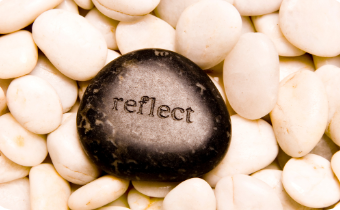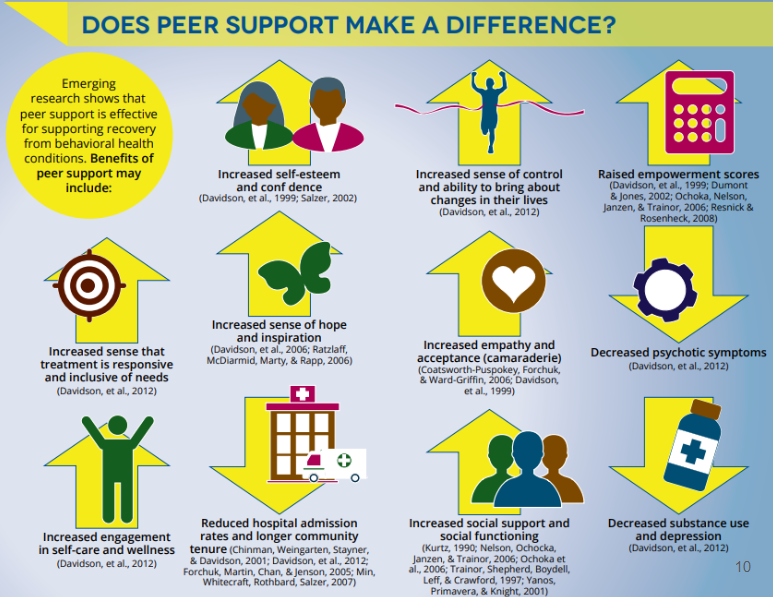Module 2 - Unit 2: Core Principle: Recovery-Oriented
Core Principle: Recovery Oriented
“Peer workers hold out hope to those they serve,
partnering with them to envision and achieve a meaningful and purposeful life.
Peer workers help those they serve identify and build on strengths and empower them to choose for themselves, recognizing that there are multiple pathways to recovery.” (SAMHSA, 2015)
Self Reflection
Supporting others in their recovery requires us to honor our own journeys. So this unit is all about you! Why?
- We have to keep learning about ourselves.
- We are all works in progress, but we can underestimate how much we change over time.
- People are not static. “YOU” in your 20s is very different from the “YOU” in your 40s.

Examining Your Own Values
Self-reflection includes taking a look at our own values. It’s not so much what am I (peer, employee, house manager, mentor), but who am I as a person? What is important to me?

Activity
Take a few moments to complete this Values Checklist (click link).
- Review your answers.
- Select the top 3 values you want to work on.
- How will you measure change?
- What will be different?
Values & Ethics
Ethics are closely tied to our personal values. Organizations often have their own ethics. AzRHA’s Code of Ethics guides recovery homes in decision making to ensure safety, respect, and integrity for all.
This Code of Ethics includes AzRHA’s Four Ethical Principles:
- Autonomy
- Non-maleficence
- Beneficence
- Justice
Reflect: How do your values align with these ethics? Where might you feel conflicted? How can these ethics guide your work? You can view AzRHA’s full Code of Ethics here.
Setting Boundaries
Knowing yourself is also knowing your boundaries.
Setting your own and respecting your clients’ boundaries creates/models relationships that are respectful, trusting, & empathetic.
“Daring to set boundaries is about having the courage to love ourselves even when we risk disappointing others.”
-Brené Brown
Reflecting on Boundaries
Peers/house managers can be under involved or overinvolved.
- Under-involvement may create distance and lack of connection.
- What are some ways this may be harmful?
- Over-involvement may create emotional risk for both house managers and clients.
- What are some types of emotional situations that may come up?
- Good boundaries are somewhere in the middle: not too much distance; not too much risk.
- What does that look like in a recovery home?
- It takes time and practice to figure out! Show up for yourself with self-compassion through the learning process. (Jack & Dennis, 2022)
Protecting Your Time
Do you ever feel like you’re being pulled in all directions at one time? You’re not alone!
- Keep in mind:
- a universal boundary is TIME
- we cannot be all things for all people, including their only support system
- Understanding your own values boundaries can help you:
- be a more effective peer or house manager
- manage competing priorities
- achieve better work/life balance
Resources: The Eisenhower Matrix can help with time management. Watch the video on the right or check out this quick article to download your own matrix.
Importance of Self Care & Compassion
Peers are caring people invested in helping others. This is what makes peer supports so good at what you do! It can also make it easy to take on too much and ignore your own needs.
Pay attention to these five important areas:
- Recognize the difficulty in recovery work – It is a big responsibility
- Be especially attentive to your personal recovery
- Recognize that you are not responsible for others successes and failures
- Engage in self-reflection
- Continue to understand, reflect, and work on boundaries. They are more fluid in a peer environment and may need adjustments.
(Williams, 2021)
Remember: You make a difference every day!
- Peers inspire hope that recovery is possible;
- Walk alongside people in their recovery journeys;
- Dispel myths and stereotypes about mental illness and substance use;
- Provide help in building self-advocacy skills; and
- Support others in dreaming big – identifying and meeting their goals!

Key Takeaways
- Being a recovery-oriented house manager/peer support begins with self-reflection.
- Identifying your values, ethics, boundaries, and priorities is a lifelong journey of growth and understanding.
- House managers/peer supports are in service and support of others. It is important to continue to take care of yourself and one another in your own health, wellness and recovery journey!
- Peers/house managers make a difference – every day!

